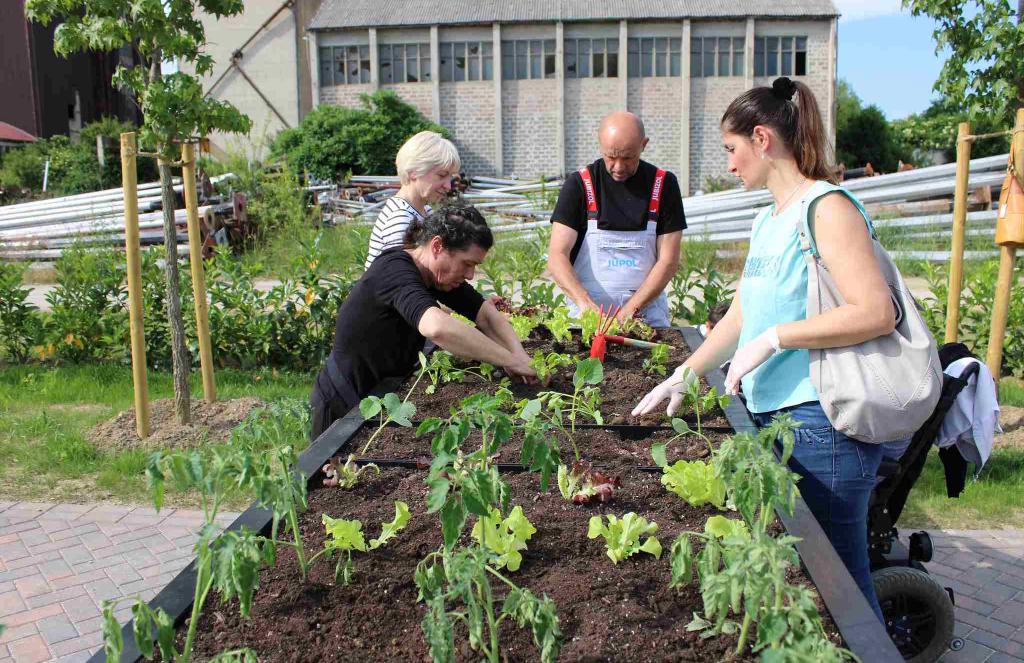Thessaloniki gets ready for its metro launch in November
The underground rapid transit lines have been under construction for almost two decades due to various project delays
 TheMayor.EU logo
TheMayor.EU logo 
Bringing together the wide range of people that live in cities is at the heart of this therapeutic garden in Zagreb, Source: proGIreg project
How justice can be implemented in climate adaptation measures
Climate change affects cities, and the people who live in those cities in very different ways, and in particular the most vulnerable. With just under one in four children in the EU at risk of poverty or social exclusion and the wealth gap widening, means that the most vulnerable groups living in our cities, such as children, older generations or people living with disabilities, are at risk now more than ever of being disproportionately affected by climate change. Finding ways to bring a social lens to urban development is essential to building better, cleaner, more equitable cities for all.
When it comes to just climate adaptation plans, cities need to learn how to incorporate social dimensions into their planning process. As Frida Lager, Research Associate at Stockholm Environment Institute (SEI) notes, it is important to recognise that there are two key components that need to be considered when addressing climate justice: “Understanding that there is an uneven burden of climate change impacts and risks and that these burdens affect groups and contexts differently. But also, that adaptation actions in themselves can benefit or burden different individuals, groups or communities in different ways.”
For Lager, this means the approach needs to be carefully considered, both in terms of distributional justice “how the benefits and harms of adaptation outcomes are allocated“, and procedural justice, “the degree to which those affected by climate risk and adaptation are recognised and able to fully participate in decision-making processes.”
Some cities like Bratislava, have sought to incorporate justice into urban development by engaging in participatory approaches that recognise the most vulnerable communities. Their SECAP 2030 plan, for example, incorporates participatory approaches by offering opportunities for youth and adults to be involved in the decision-making processes that shape their city.
Bringing together the wide range of people that live in cities is at the heart of the newly designed therapeutic garden in Zagreb (Croatia). Built on an old industrial site, this space has been revitalised and specially designed with children and adults with disabilities in mind. Urban and social regeneration areas often suffer from social and economic inequalities, lack quality green spaces and are vulnerable to climate change effects and natural hazards. Recognising this, the EU-funded proGIreg project identified old industrial sites in a number of European cities and has been adapting and transforming them into spaces that meet the needs of community members at large.
Realising climate adaptation measures such as bringing these citizens' needs into the policy arena and actively addressing them as part of climate justice can be a complex process for cities. A partnership between the Covenant of Mayors for Climate and Energy Europe, ICLEI Europe, and Climate Alliance have set up the EU Policy Support Facility (PSF) to help cities address the uneven burden of climate change at the local level through adaptation measures.
As Luca Arbau, Officer for Sustainable Resources, Climate and Resilience at ICLEI Europe notes, “It is not just about looking for ways to slow the effects of climate change through climate mitigation but also learning how to apply these in a fair and just way through climate adaptation measures. It involves integrating a social dimension into the planning process in cities.”
Findings from this article are based on a series of free webinars offered through the PSF to support cities to foster local resilience. The PSF is currently assisting cities implement adaptation measures through knowledge exchange and capacity building via national workshops, peer-to-peer learnings, technical assistance and podcasts.

The underground rapid transit lines have been under construction for almost two decades due to various project delays

Now you can get your wine in Talence by paying directly in Bitcoin

That’s because the state has to spend money on updating the railway infrastructure rather than subsidizing the cost of the popular pass

Rethinking renewable energy sources for the urban landscape

The examples, compiled by Beyond Fossil Fuels, can inform and inspire communities and entrepreneurs that still feel trepidation at the prospect of energy transition

Now you can get your wine in Talence by paying directly in Bitcoin

The 10th European Conference on Sustainable Cities and Towns (ESCT) sets the stage for stronger cooperation between the EU, national and local level to fast track Europe's transition to climate neutrality.

At least, that’s the promise made by the mayor of Paris, Anne Hidalgo

The underground rapid transit lines have been under construction for almost two decades due to various project delays

At least, that’s the promise made by the mayor of Paris, Anne Hidalgo

Hostal de Pinós is located in the geographical centre of the autonomous region

Despite its church-y name, the district has long been known as the hangout spot for the artsy crowds

Urban dwellers across the EU are having a say in making their surroundings friendlier to people and the environment.

Forests in the EU can help green the European construction industry and bolster a continent-wide push for architectural improvements.

Apply by 10 November and do your part for the transformation of European public spaces

An interview with the Mayor of a Polish city that seeks to reinvent itself

An interview with the newly elected ICLEI President and Mayor of Malmö

A conversation with the Mayor of Lisbon about the spirit and dimensions of innovation present in the Portuguese capital














